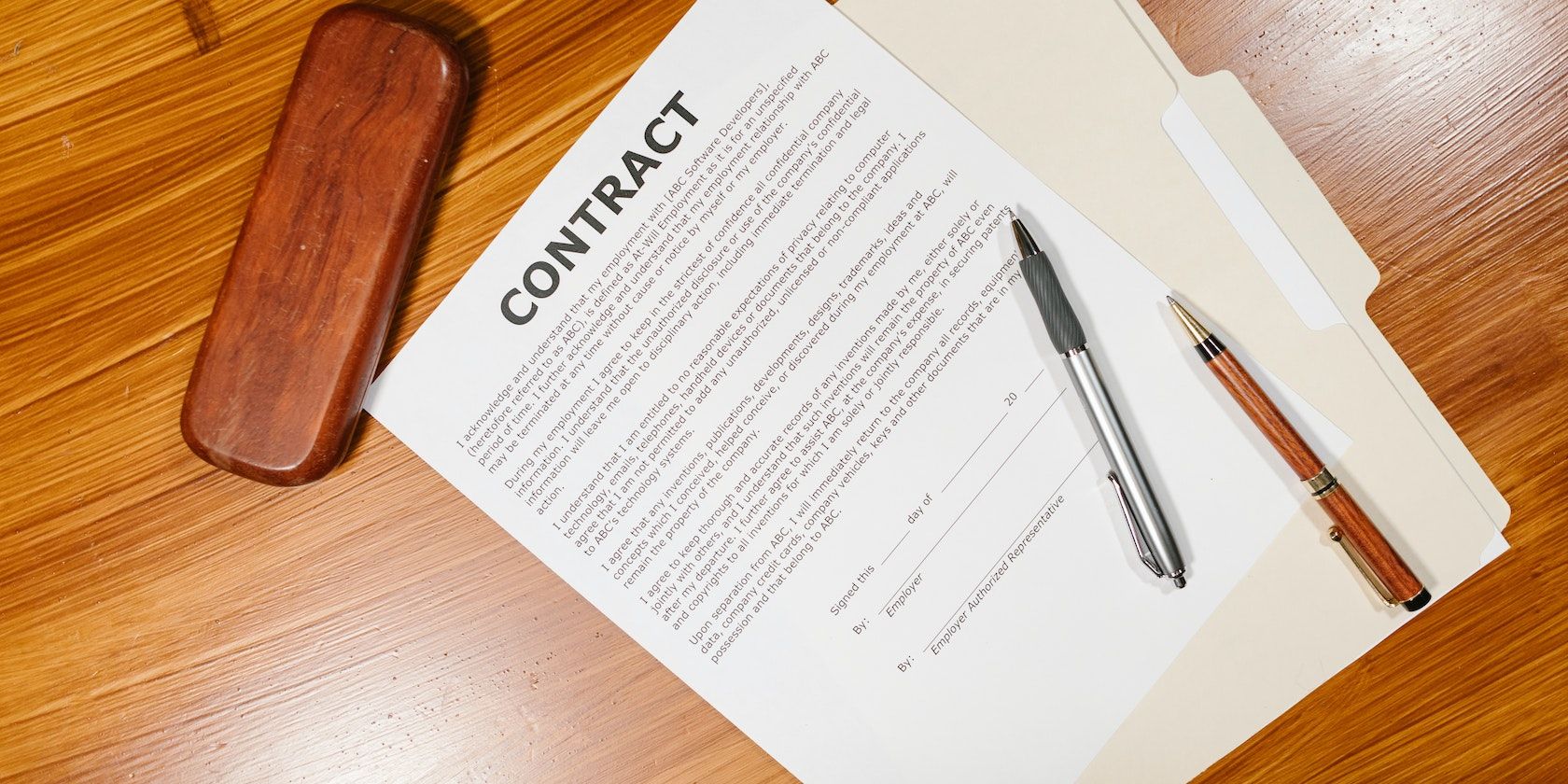The freelancing world offers enormous freedom and flexibility. It's the promise of being your own boss and conducting business in a way that's most convenient for you. Unfortunately, being a freelancer has its downsides.
Unlike working in a structured company environment, being a freelancer means, for most aspects of your business, you're on your own. There's no company legal department to back you up when contractual conflicts arise. It's left to you to protect yourself proactively. But how?
Why You Need a Freelance Contract
Business laws aren't exactly straightforward, so it might not be a good idea to play freelancer and lawyer at the same time. Despite this, you're supposed to do business with a wide range of people, some of whom might try to take advantage of you.
Your safe haven is a freelance contract, a document simple enough for any freelancer to piece together yet powerful enough to protect your interest in a contract. A freelance contract insulates you from potential risk, especially malicious clients that just won't pay up.
However, freelance agreements aren't just about ensuring you get paid. It's an important tool for protecting your interests in all aspects of a freelance business transaction. It also gives your client assurance that their interest is also being protected, ensuring a win-win for both parties. A freelance contract:
- Highlights your professionalism as a freelancer.
- Explains your key deliverables by itemizing what products or services you'll need to deliver to conclude a contract.
- Holds you and your clients accountable to the terms of the agreement.
- Clearly explains and handles objections about payments, potential revisions, ownership rights, and deadlines.
But what exactly do you need to include in your freelance contract? What components are needed to plug any potential loopholes that might lead to contractual conflicts?
7 Things to Include in Your Freelance Contract
Irrespective of the kind of freelance services you provide, here are seven foundational components that should be present in your freelance contract.
1. Introduction of Parties (Names, Contact Information, and Dates)
This is typically the first segment of a freelance contract. It should ideally state the parties involved and the role they play, the date the contract was entered (and effected), as well as the purpose of the contract.
It's important to use the complete legal names of the parties involved, as against using initials or pseudonyms in place of real names. So, "M. Timothy" instead of "Maxwell Timothy" would be inappropriate. And "Coke Company" instead of "The Coca-Cola Company" would also be inappropriate.
In some cases, it might be necessary to specify different dates for when the contract was written, when each party signed it, and when it will be affected. This opening segment will set the tone for the entire freelance agreement, so it's important to get the details right.
2. The Scope of Work and Deliverables
Apart from the financial side of a contract, the scope of work (or deliverables) is typically the cause of most contractual conflicts. Your freelance agreement must set clear expectations of deliverables from the start of a contract. You should aim to provide as many details as possible as regards the service or product the client should expect from you, the freelancer.
This would prevent scope creep, where clients change the project requirements without a corresponding pay increase. The best way to make things really clear is to include the project outline, key milestones, and items that might be mistaken for being included in the scope of the work but are not.
3. Payment Details
According to a poll by Independent Economy, around 74% of freelancers report not being paid by their clients on time. Some go unpaid for two or more months. Some don't get paid at all due to some conflicts that arise during the course of the contract. Don't be that freelancer.
It is critical to clearly define the terms of payment in your contract. Payment details aren't just about the amount you'll get paid. It should include the "what, how, and when."
What amount should be paid? How will it be paid? Which payment channels are acceptable, e.g., PayPal, Payoneer, or Gift cards? When will it be paid? After the completion of a contract? Or after clearly defined milestones? Here are some alternative payment channels you can use for receiving payment as a freelancer.
A smart practice to get your client invested in a project is to ask for some percentage of the payment upfront. An upfront payment clause will also help you weed out potential scammers on freelancing sites.
Based on your discretion, you can consider adding a lateness fee clause to your contract in case the client delays in payments. If you're not sure how to decide your rates, we've previously detailed some important tips on setting your freelance rates.
4. Number of Revisions Your Rate Covers
Prototypes or first drafts aren't always perfect. This is why a revision clause should be included in your freelance contract. If you don't set clear boundaries, your client can abuse their revision privilege. Your revision clause should specify how many revisions the project will cover before you have to start charging for extra revisions.
Also, ideally, outline the timeline for when the clients can send in revision requests and what happens when the client delays. This would protect you from clients wanting more for less and guard against time-consuming infinite rounds of revisions.
5. Termination terms
Contracts don't last forever. Even if you're in it for the long haul, it's important to detail mutually acceptable terms by which either party can exit or terminate the contract. The termination terms will help you conclude or stop a contract without being liable for breaching the contract.
If you aren't clear enough on your termination terms, you could end up being stuck doing a job you no longer want to do. The terms of termination must also list the conditions under which the client is allowed to exit or terminate a contract and what should happen after the termination of a contract. Equally important are the penalties attached to terminating the contract outside the terms of termination listed in the contract.
6. Ownership Rights
It's crucial to spell out who owns the tangible and non-tangible items related to the project you're hired to execute. This will help you avoid ownership tussles during or after the completion of a project. This is especially important when creating original content for a client. You have to be clear if they own the right to any of the draft or final product. You should also ideally clarify when the rights can be transferred to you, if applicable.
As a general rule, add a statement that you own rights to the completed work until the client pays in full for it. In cases where you want to include the finished work in your portfolio, make sure to seek permission and state it in your contracts. Clients aren't the same. Some may approve or disapprove of using the project in your portfolio. You don't want a lawsuit on your head for using samples of something you created but do not own.
7. Signatures
The parties involved have agreed to the terms of the contract. Before you start the project, you and the client must append your signature. A signed agreement proves that the parties involved read, understood, and agreed to the terms of the contract. Fortunately, there are some good e-signature tools you can use to sign documents remotely.
If you need some guidance on how to put all seven points together to make a contract that works, we've previously done a comprehensive guide on how to write a freelance contract.
Protect Your Freelance Business
Although there are varying local laws guiding business transactions depending on where you stay, a simple freelance contract can give your freelance business a lot of protection.
It ensures you get paid for your work, establishes trust between the transacting parties, and sets clear expectations. Now that you know what to include in a contract, make it a personal principle to draft a contract for every business opportunity that comes your way.





